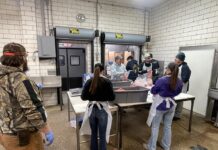MADISON, Wis. – Organic food sales in the United States have grown 20 percent or more annually for the past decade and remain strong.
A new report details the growth of organic agriculture in Wisconsin and the nation, and encourages state investment in this value-added marketing strategy.
Little support. “Wisconsin has the third-highest number of certified organic farms in the nation, but our state government and universities provide relatively little support for organic farming,” said Matt Mariola, a graduate student at the University of Wisconsin-Madison and co-author of the report.
“Strategic public and private investment in organic agriculture and marketing could result in economic growth for our state.”
Titled “Organic Agriculture in Wisconsin: 2003 Status Report,” the report was released jointly by the UW-Madison Center for Integrated Agricultural Systems and Gaylord Nelson Institute for Environmental Studies.
Big in Wisconsin. According to the USDA, Wisconsin ranks first in the nation for organic livestock production, with 22 percent of the nation’s total organic milk cows.
It ranks second in the nation for acres of organic hay and silage, and third for acres of organic corn, soybeans, oats and barley.
Although organic crops and livestock represent just a small fraction of Wisconsin’s total agricultural production, organic production grew 92 percent from 1997-2001.
The success of Organic Valley in La Farge demonstrates the economic growth potential of the organic food industry in Wisconsin, according to Mariola.
Increased sales. Organic Valley’s sales grew from $9 million in 1995 to $125 million in 2002-an increase of more than 1,200 percent.
In late 2002, when milk prices fell to as low as $11 per hundredweight, Organic Valley was able to pay their farmers nearly twice this figure.
Surrounding states such as Minnesota, Iowa and Michigan are investing in organic marketing, research and extension to support entrepreneurial growth in this value-added industry.
Wisconsin’s state government recently pledged support for organic farming and food systems.
Gov. Jim Doyle’s “Grow Wisconsin” agenda for agriculture includes a goal for Wisconsin to become an international leader in organic food production, processing and marketing.
Look at the report. The report adds support for such an investment initiative. “Organic Agriculture in Wisconsin: 2003 Status Report” is available free on the CIAS Web site: www.wisc.edu/cias/pubs/org113.pdf.
Copies can also be purchased for $3. To order a print copy, call 608-262-5200 or e-mail phaza@wisc.edu.
Get 4 Weeks of Farm and Dairy Home Delivered









